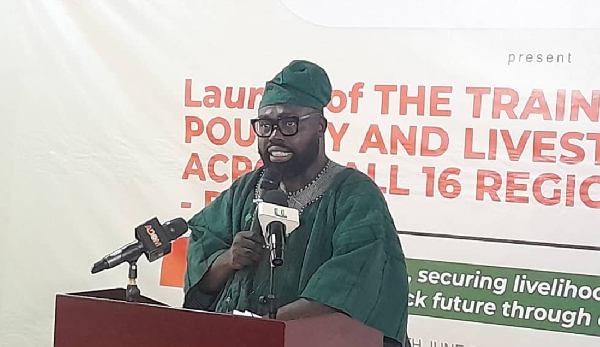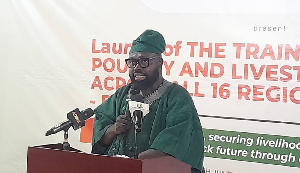A comprehensive roadmap for a training program under the Feed Ghana flagship initiative has been unveiled, paving the way for a nationwide rollout of the ambitious Young Poultry and Livestock Farmers Initiative.
This public-private partnership (PPP) initiative aims to engage 20,000 Ghanaian youth—with a focus on women, farmer groups, and agripreneurs—over a four-year period. Phase I targets 10,000 beneficiaries between 2025 and the end of 2026.
The program is expected to generate approximately 1.7 million direct and indirect jobs. The roadmap outlines a strategy for regional training sessions, held twice monthly across all 16 regions, using a blended learning approach. This includes digital platforms, field demonstrations, and one-on-one mentorship, all delivered in local languages to ensure accessibility and impact.
At the official launch on June 10, 2025, in Accra, Dr Peter Boamah Otokunor, Director of Presidential Initiatives in Agriculture and Agribusiness, emphasized the urgency of revitalizing Ghana’s poultry and livestock sectors.
“Agriculture is no longer just about hoes and cutlasses. It has transformed into a business that requires innovation, productivity, and the application of modern technical and digital tools,” he stated.
Dr Otokunor noted that President Mahama is committed to rolling out a series of ambitious, youth-centered agricultural programs under the Feed Ghana initiative. These efforts are aimed at dismantling structural barriers that limit the participation of women and youth in agriculture and agribusiness value chains.
The next phase of the initiative will engage 55,000 households, targeting the production of one million improved broiler breeds. In addition, the government plans to establish and upgrade feed mills to produce more affordable feed for farmers.
“With strong partnerships and political will, Ghana’s livestock and poultry sector will rise again,” Dr Otokunor declared.
Dr. Doris Yaa Osei, Acting Deputy Director at the CSIR-Animal Research Institute, underscored the challenges Ghana faces in meeting its rising meat demand. She highlighted the Grains and Legumes Development Project, also under Feed Ghana, as a key intervention to boost the production of maize, rice, soybean, and sorghum—critical components for affordable animal feed.
Chief Nathaniel Ebo Nsarko, CEO of Feedico Ghana Limited, highlighted the transformative nature of the training roadmap.
“Through this program, the government aims to certify and empower over 10,000 Ghanaian youth to become skilled and business-oriented players in the poultry and livestock industry,” he said.
The program aligns with several UN Sustainable Development Goals (SDGs), including SDG 2 (Zero Hunger), SDG 8 (Decent Work and Economic Growth), SDG 12 (Responsible Consumption and Production), SDG 13 (Climate Action), and SDG 7 (Affordable and Clean Energy).
A unique aspect of the training is its delivery in local languages, ensuring maximum comprehension and inclusion.
“Knowledge must not be blocked in translation. It must reach the people who need it most, in the language they understand,” Chief Nsarko stressed.
The roadmap was developed collaboratively by the CSIR-Animal Research Institute, Feedico Ghana Limited, Presidential Initiatives, the Ministry of Food and Agriculture, the Ministry of Local Government, and other government partners.
It addresses two pressing national challenges: low poultry and livestock self-sufficiency and high youth unemployment, particularly in rural areas where agriculture remains underexploited due to lack of training, mentorship, and financial access.

KA



